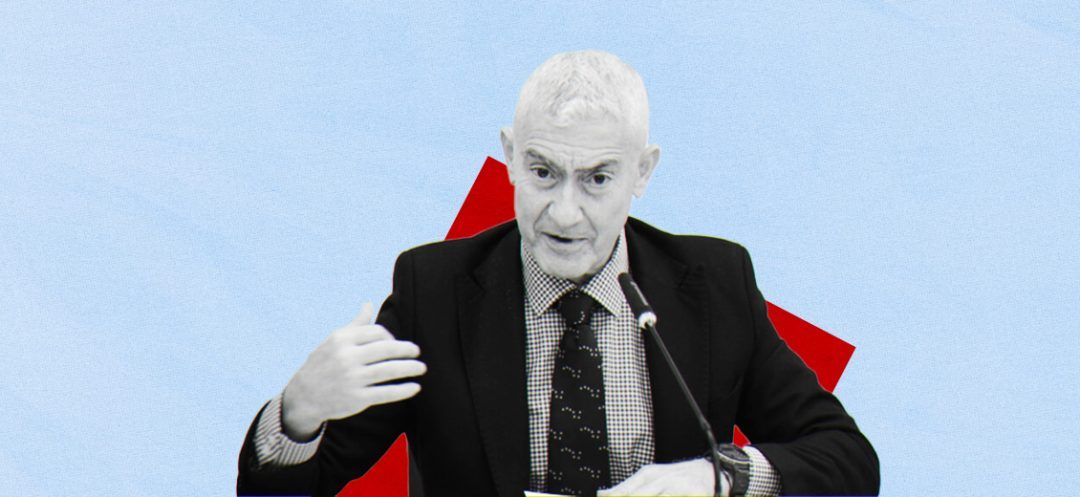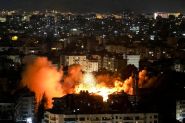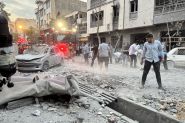- Home
- War in the Middle East
- 3 Questions for General Maroun Hitti: 'Wars Begin When You Will, but Do Not End When You Please'

Since the beginning of the confrontations between Hezbollah and Israel in southern Lebanon, Israeli strikes have increasingly targeted deeper into Lebanese territory, reaching the Beirut southern suburbs and even the Bekaa Valley. Amid growing concerns about these developments and the possibility that the attacks may herald a new phase in the war, This is Beirut interviewed General Maroun Hitti.
Why do you think Israeli strikes are now extending beyond southern Lebanon?
Simply because Hezbollah operates throughout all of Lebanon, not just in the south.
This shift in targeting represents a major escalation as Israel moves beyond previously established red lines with Hezbollah and expands the scope of its military actions throughout Lebanon.
The entire Lebanese territory is now involved in the unfolding operations, not just the southern region.
Israeli Defense Minister Yoav Gallant has noted that the focus of Israeli military operations is switching from southern Israel and Hamas in Gaza to the north, Lebanon and Hezbollah.
Israel is now concentrating its efforts on its northern border, as the conflict with Gaza, once seen as existential, is no longer the main focus. As a matter of fact, Hamas is “virtually” dismantled as a military force. The northern front has become Israel’s new priority and existential challenge. Consequently, Israel is moving beyond the previously established boundaries.
At this stage, Israel and the United States are less concerned with gaining territory, eliminating key figures or conducting deep strikes. Their main objective is to deny Hezbollah and Hamas any opportunity to claim victory—an essential component of Hezbollah’s strategic messaging.
Hamas and Hezbollah have made two miscalculations: relying on the human shield strategy as a foolproof defense and underestimating their enemy’s expertise in strategic communication.
Is Hezbollah driving Israel’s reactions, or is it the other way around? Who's truly steering the conflict today?
The conflict was sparked by Hezbollah’s attack on Israel on October 8. Initially marked by limited exchanges, the situation has since escalated dramatically.
“Wars begin when you will, but they do not end when you please,” says Machiavelli. This perfectly describes Hezbollah’s situation: they initiated the conflict, but now lack the means to conclude it.
Israel has taken charge of the conflict, with the strategic initiative and the strength to sustain its position.
Hezbollah is now on the defensive and clearly struggling. They expected the conflict between Israel and Hamas to be short-lived, relying on Hamas’ strategy of using human shields to provoke Israeli retaliation and generate international condemnation. The goal was to force a ceasefire and negotiations, allowing Hamas to claim victory. However, the situation has spiraled beyond their control.
Hezbollah has lost its grip on the situation. Even if they were to halt their attacks today, Israel is unlikely to stop its operations. For the Israeli government, reverting to the pre-October 7 status quo at the northern border is no longer an option. They will only end their actions once the situation at the border has been thoroughly resolved, allowing displaced northern residents to return safely and permanently.
The solution hinges on the strict enforcement of Resolution 1701, which demands Hezbollah’s disarmament and places accountability on both UNIFIL and the Lebanese government, though the latter has yet to take a clear position. Furthermore, Resolution 1559, which calls for the dismantling of all militias in Lebanon, including Hezbollah, needs to be fully implemented by the Lebanese government.
The only viable alternative is for the conflict to persist indefinitely until Hezbollah encounters a “bitter end,” where its ability to launch offensive operations is thoroughly neutralized.
Is this escalation simply a display of power, or does it mark the onset of a new phase in the war?
Neither option applies.
Israelis don’t need to prove their strength, it’s rather a sign of the Israeli intelligence’s ability to penetrate Hezbollah's inner circle.
The recent escalation follows high-profile strikes in the southern suburbs of Beirut, such as the assassination of Hezbollah’s military leader, Fouad Shokr, and earlier, Hamas’ second-in-command, Saleh al-Arouri. The focus has also shifted to the Bekaa Valley, 80 km north of the border, targeting sites previously unsuspected of being linked to Hezbollah, such as munitions and weapons depots. This has led to speculation about possible defections among high-ranking Hezbollah officials. If these rumors are true, it would put Hezbollah in a dire situation, thus suggesting that Israel has effectively won what has now become an intelligence-driven war.
Moreover, Israel's intensified military actions in Lebanon don’t represent a new phase of the war, but rather a natural development. This escalation is not a “surprise,” it fits a predictable pattern of escalating violence and expanding confrontation.
The current developments were predictable from the moment Hezbollah began its attacks on Israel after October 7. It was clear that Israel would capitalize on any opportunity to strike, even outside the areas implicitly agreed upon with Hezbollah, as illustrated by the assassination of Fouad Shokr in Beirut's southern suburb.
Read more




Comments